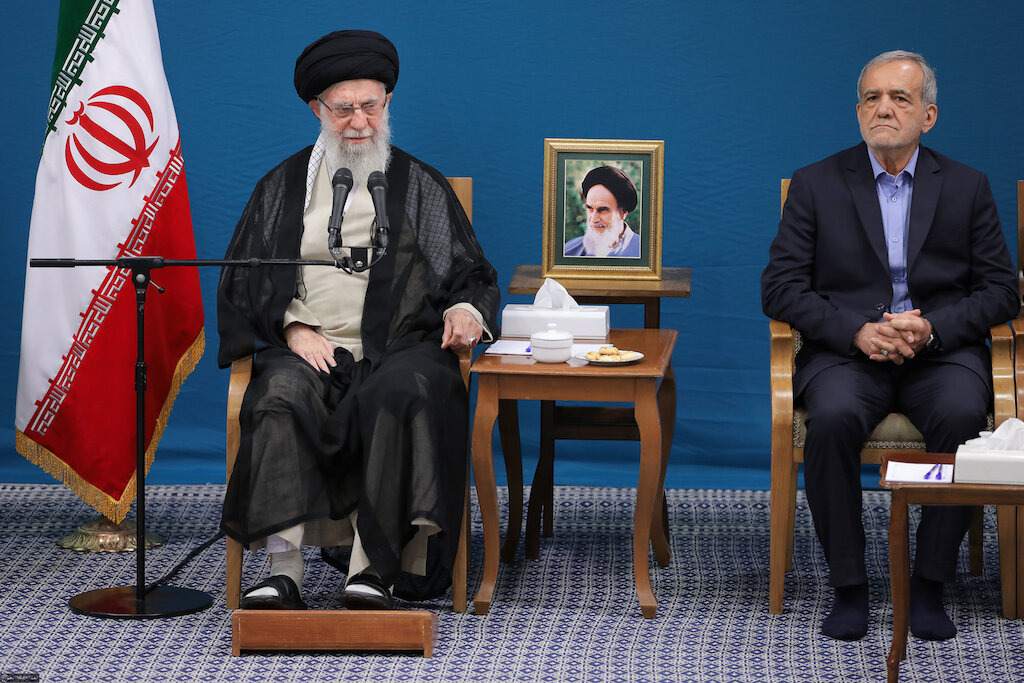
With the Trump administration sending conflicting signals about its intentions on dealing with Iran, the Iranian leadership is once again divided on how to respond.
One faction is trying to paint a grim picture in which the US will give Israel enough support to inflict a heavy defeat on Iran to complete the defeats already inflicted on Tehran's allies in Iraq, Syria, Lebanon and Yemen. Such a humiliation will encourage the regime's opponents both inside and outside the country to take to the streets and seize power while a demoralized Islamic Revolutionary Guard Corps will do what it did in Syria, that is to say, run for economic crisis cover to save its skin.
The same faction argues that the current economic crisis has sapped the will and energy of the regime's dwindling support base, making regime change a real possibility for the first time.
So, how to negotiate such a dangerous bend of the road?
The faction's luminaries, including President Masoud Pezeshkian, suggest opening talks aimed at preventing a war and allowing things to cool down.
But who should one talk to?
Talking to the US is supposed to be verboten according to "Supreme Guide" Ali Khamenei who cites a fatwa by the founder of the regime, Ruhollah Khomeini, to that effect, plus an act of the "Islamic Majlis," the ersatz parliament that endorses the ban.
The answer is: the European trio of France, Germany and Great Britain, which coincidentally have bumpy relations with Washington.
The theory goes that the trio will welcome a diplomatic coup to restore part of the prestige they have lost because of President Donald Trump's decision to exclude them from his Ukraine peace initiative and plans for the future of Gaza.
But what could one talk about without being forced to offer concessions that result in a massive loss of face?
The talk party suggests that Iran should offer to freeze its nuclear program for two to three years, at the end of which it would decide which direction it should take. Right now, Iran is spending vast resources on a program that has no obvious civilian or military use or justification.
In exchange, the European trio will use the mechanism provided by UN Security Council Resolution 3221 to avoid opening the path for taking military action against Iran. The above-mentioned resolution expires in October, making any unintended consequence a possibility. A deal with the Europeans could help ease pressure on Iran, inject some vitality in a moribund economy, and help prevent a massive popular revolt.
Those who market the above analysis assume that the US, and for that matter Israel, will stand by and see how the Iranian adversary bounces back from the edge of doom.
That analysis is opposed by the faction still totally loyal to Khamenei, who insists that any show of weakness could accelerate moves towards regime change. His advice is to stand firm and prepare for war. The first step is to build a war chest. This is done by reducing the supply of foreign currency to the market to allow the national currency to fall further. The currency which fetched $1 with 650,000 rials now needs 900,000.
This is a trick used by the Allies when they invaded and occupied Iran in World War II.
Because their expenditures in Iran were in the local currency, they forced a 50 percent devaluation of the rial.
Now used by Khamenei, that trick increases the state's purchasing power while reducing the purchasing power of Iranian families, including the state's military and civilian personnel. To partly compensate for that, the key personnel needed in a war are granted exceptional bonuses.
Khamenei, who controls law and order forces, has put them on partial alert to nip any revolt in the bud. This is accompanied by a massive crackdown against potential dissidents, especially in Tehran, with reports of arbitrary arrests.
All this does mean that the "Supreme Guide" isn't prepared to perform another of his "heroic flexibilities" by accepting a deal with the "Great Satan" to sit out Trump's four-year tenure, a game that led seven consecutive US presidents up the garden path, allowing the Islamic Republic of Iran to approach its golden jubilee.
Today, to talk or not to talk is a question not only for rival factions in Tehran but also for powers that, rightly or wrongly, are convinced that there could be no regional peace and stability without persuading or forcing what François Mitterrand called "le grand perturbateur" ("the big troublemaker") to change or to be changed.
Amir Taheri was the executive editor-in-chief of the daily Kayhan in Iran from 1972 to 1979. He has worked at or written for innumerable publications, published eleven books, and has been a columnist for Asharq Al-Awsat since 1987.
Gatestone Institute would like to thank the author for his kind permission to reprint this article in slightly different form from Asharq Al-Awsat. He graciously serves as Chairman of Gatestone Europe.


